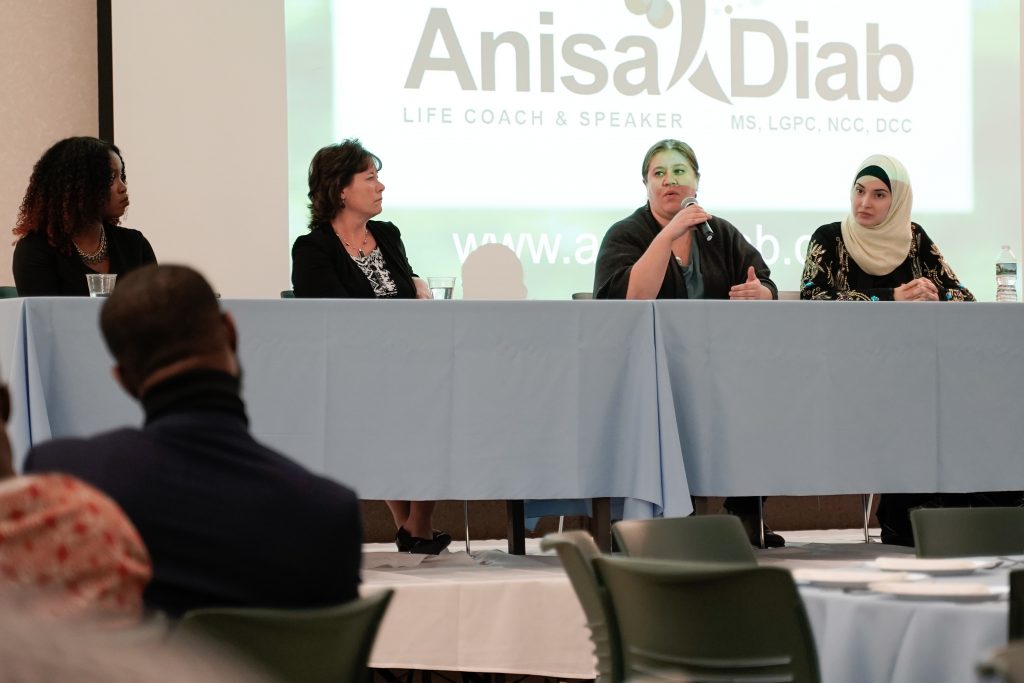Ending the stigma against mental health was just one of the many topics discussed at the interfaith banquet hosted by the Muslim Student Association (MSA) in Old Union Hall on Sunday night.
The event, titled “Mental Health Matters,” was co-sponsored by Binghamton Health Promotion and Prevention Services, University Counseling Center (UCC), Hillel at Binghamton and the Campus Bible Fellowship. It featured guest speaker Anisa Diab, a licensed mental health counselor and interfaith speaker who uses her training on mental wellness to understand Islam and coping with Islamophobia. Diab spoke about the stigma surrounding mental health, how to help someone experiencing mental health issues and the difficulty of being Muslim and a first-generation American.
“It can be difficult to navigate that [cultural difference] and develop a sense of identity,” Diab said. “Should I call myself Mohammad or should I call myself Mo, should I call myself Ibrahim or should I call myself Abe?”
After, a panel of speakers including Diab, Rabbi Marley Weiner, the senior Jewish educator at Hillel, Shannon Berkheiser, a member of the board of directors at the Crime Victims Assistance Center and Arlene Arisme, a senior counselor at the UCC, opened up a discussion and Q&A, followed by a dinner.
According to Mahmoud Almady, vice president of the MSA and a sophomore majoring in biochemistry, the event was originally supposed to be much smaller and separate from the organization’s interfaith banquet.
“Originally, this was not going to be a big interfaith event — it was going to be a small event we did one Friday evening, but then we kept talking about it more and more and we felt the need to devote our full banquet to this because it deserves that sort of attention,” Almady said. “We find that mental health and self-help, at least anecdotally speaking, are not being addressed in the Muslim community as much as it should in my opinion, so we decided to set up this whole event to show that there is a mental health side to our religion.”
Almady also said a discussion surrounding mental health was brought to the organization’s attention after three of its members got involved in M-HOPE, a team of students who work with the UCC to engage and educate the campus community on mental health.
“Three of our executive board members work with M-HOPE on campus,” Almady said. “So, they’re well-versed in this, and when they proposed this idea and kept describing it and all the angles we could look at it through, it felt like a good idea.”
The interfaith component of the panel was very important, according to Hebba Ahmad, secretary of the MSA and a sophomore majoring in integrative neuroscience.
“It kind of puts it in a generalized perspective, like what everyone says about [mental health],” Ahmad said.
According to Haseeb Rahman, president of the MSA and a junior majoring in biochemistry, the goal of the event was to address the stigma attached to mental health, especially in the Muslim community.
“We want to achieve raising awareness for mental health, not just that it exists but also that it’s extremely important and we want to touch upon the religious side as well,” Rahman said. “In our holy book, a lot of the chapters are consoling the prophet [Muhammad], peace be upon him. If mental health wasn’t important, then it’s not something God would be doing to the prophet. This general theme of consoling someone and recognizing their feelings is very important, coming from the relationship between God and the Prophet, and since it’s in our holy book, it’s something that should be paid attention to as well.”



